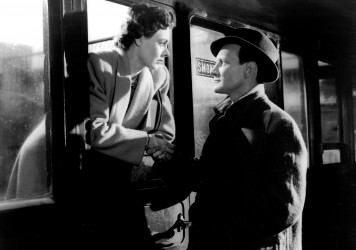Is this Brigitte Bardot-starring satirical drama Jean-Luc Godard’s best movie? We think so.
“Is that smile mocking, or tender?” asks bemused screenwriter Paul Javal (Michel Piccoli) of his naked, newish wife Camille (Brigitte Bardot), as the two pace their half-decorated, newly acquired flat in Rome. They are conducting a premature autopsy of their marriage in Jean-Luc Godard’s multi-lingual French-Italian co-production Le Mépris.
Godard’s sixth movie – as good a candidate as any to be named the director’s masterpiece – itself poses a plenitude of such rhetorical questions, cruelly connecting derisive darts and compassionate insights. The film is the director’s reworking of novelist Alberto Moravia’s “nice, vulgar” tale of Paul and Camille’s tragicomic misfortunes during a Mediterranean location film shoot of Homer’s ‘The Odyssey’. The film-within-a-film has been classically re-imagined by director Fritz Lang (playing, very movingly, himself ) and commercially bastardised by philistine producer Jeremiah Prokosch (Hollywood hardman/villain Jack Palance, hyperbolically, scarily, sociopathically entertaining).
An immense amount of off-screen activity is at work too: Bardot, in 1963 and at the height of her celebrity, had not been developing as an actress under her husband, the producer-director Roger Vadim. Despite reported difficulties (alongside Godard weaving variations of his own internecine relationship with wife Anna Karina into Bardot’s role and on-screen marriage), she delivers perhaps her finest performance, embodying her instinctive, life-coerced character with a potent cocktail of sensual allure, fierce mystery and genuine pathos.
Likewise, Godard, smarting from the lambasting of his previous movie, Les Carabiniers, was determined, in his own interpretation of classical film grammar, to show he knew exactly where to place a movie camera. To this end, he encouraged genius cameraman Raoul Coutard to orchestrate with his ’Scope camera (“suitable only for filming snakes and coffins”) an arresting series of sinuous, almost spirographic dances. These graceful glides and pans were a response to the imperious, opaque-eyed gods and meanders for the mere, foolish mortals.
Known as the Godard favourite amongst the non-Godardians, Le Mépris certainly is one of the director’s more easily consumable works. A fine contribution to the genre of movies on moving-making – on the death of cinema, and the possibility of its renewal – it also offers accessible and meaningful musings on, amongst others, such matters as destiny and freewill, empathy and self-interest, sensuousness and aestheticism, principle and pragmatism, the natural and the industrial, the poetic and the prosaic and using comedy and tragedy to tell the stories of human lives.
In short, it is a full and immensely satisfying work, its tensions and teasing contradictions, moral, cinematic and intellectual, making it as exhilarating, alive and modern a film as any. Georges Delerue’s sublime score is crucial in uniting all the film’s irreconcilables. The repeated motifs and melodies themselves combine, as does the movie, the classical and the modern, deepenening the meanings and the mixed emotions of defiance and nostalgia that make Le Mépris so very affecting and – a word Godard would be proud of – so very beautiful.
Published 29 Dec 2015
Is this Jean-Luc Godard’s greatest film?
You know what? It just might be.
A knowing, tragic-comic aria for love and moviemaking.

Rural train platforms were transformed forever by this high peak of screen romance from David Lean.

Mia Hansen-Løve’s extraordinary fourth feature is about the impossibility of beat-matching life and fashion.